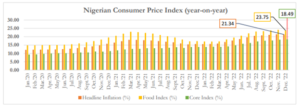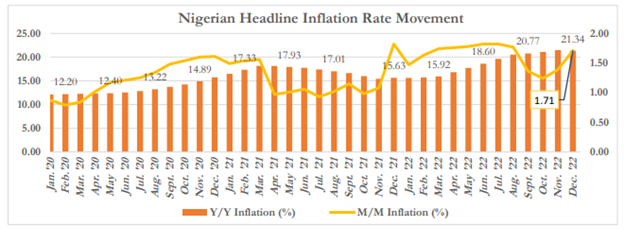The National Bureau of Statistics (NBS) yesterday (Monday, 16 January 2023) released the Consumer Price Index (CPI) which measures inflation rate in the country for the month of December 2022. According to the CPI data, the Nigerian Headline Inflation rate eased to 21.34% year-on-year (y/y), representing 13bps lower than 21.47% reported in November. Notably, this was the first time in twelve months (the whole of 2022) that the inflation reading on y/y basis had eased.
However, on a month-on-month (m/m) basis, the inflation index spiked upward to 1.71% in the period under review, representing 32bps higher than 1.39% reported in November. Markedly, it was the second time in a row the m/m headline inflation has witnessed an upward pressure, mostly attributable to the sharp increase in demand associated to the festive season and increase in the cost of production amid rise in energy cost, transportation cost and exchange rate depreciation
Further analysis of the CPI by its classifications showed that Food sub-index recorded lower pressure as it moved to 23.75%, representing 38bps downtick against November’s number (24.13%). When viewed against comparable period of 2021 (when the index was at 17.37%), the food index spiked by 638bps y/y. According to the NBS, the y/y food index upward pressure fed from sustained pressure in the prices of bread & cereals; oil and fat; potatoes, yam, and other tubers. On a m/m basis, the food inflation rate was higher at 1.89% compared to 1.40% in the prior month. The m/m upward pressure here was equally fuelled by the y/y causative factors stated above.
For the Core sub-index, upward pressure increased further by 25bps to 18.49% in December, compared to previous month’s record (18.24%). When correlated against comparable period of 2021 (when the index was at 13.87%), the core index spiked by 462bps y/y. However, on a m/m basis, price pressure here moderated to 1.33%, representing 34bps lower than 1.67% reported in November. Markedly, the key drivers of the y/y core inflation rate here were continuous price shocks in items such as gas & liquid fuels, passengers transport by air, passenger travel by road, solid fuel, and vehicles’ spare parts.
Primarily, the core inflation index has continued to be driven by persistent exchange rate pressure, higher energy costs, and supply chain bottlenecks amid the Russia-Ukraine crisis.

Would the MPC kick off the year by maintaining a hawkish stance? The CBN’s Monetary Policy Committee (MPC) is scheduled to hold its first meeting of the year on the 23rd and 24th of January 2023 (next week). Recall that at the previous meeting in November, the Committee voted unanimously to raise the Monetary Policy Rate (MPR) by 100bps to 16.50%, to stem the tide of upward inflation and reduce the exchange rate depreciation via foreign capital inflows. How well the decision has impacted on the economy is yet to be seen.
Notwithstanding the m/m decline in the inflation rate in December, it is still stubbornly high at 21.34% y/y, and higher than 21.09% y/y reported prior to the last MPC meeting. For the export reserves’ account, it modestly gained $13.39 million (or +0.04%) to settle at $37.21 billion as of 13 January, compared to the closing number as of 22 November when the committee held its last meeting.
The Naira at the FX market using the I & E window has depreciated further by ₦16.00 (or -3.59%) between the last meeting and the closing rate as of 16 January 2023, to settle at ₦461.67 against the U.S. Dollar. Given the above mixed records and the Committee’s drive to restore price stability while providing necessary support to the economy, in our view, a policy hike appears to be in the horizon again.
Inflation Outlook for January 2023
Aside the ongoing harvest season, especially of rice, beans, tomatoes, and garri, other staple food items were significantly affected by the recent flooding in swathes of Nigeria’s food basket region, while ongoing scarcity of fuel caused by FX and logistical challenges is producing a major upward pressure on prices across the country. As such, we anticipate a higher headline inflation rate for January 2023.








